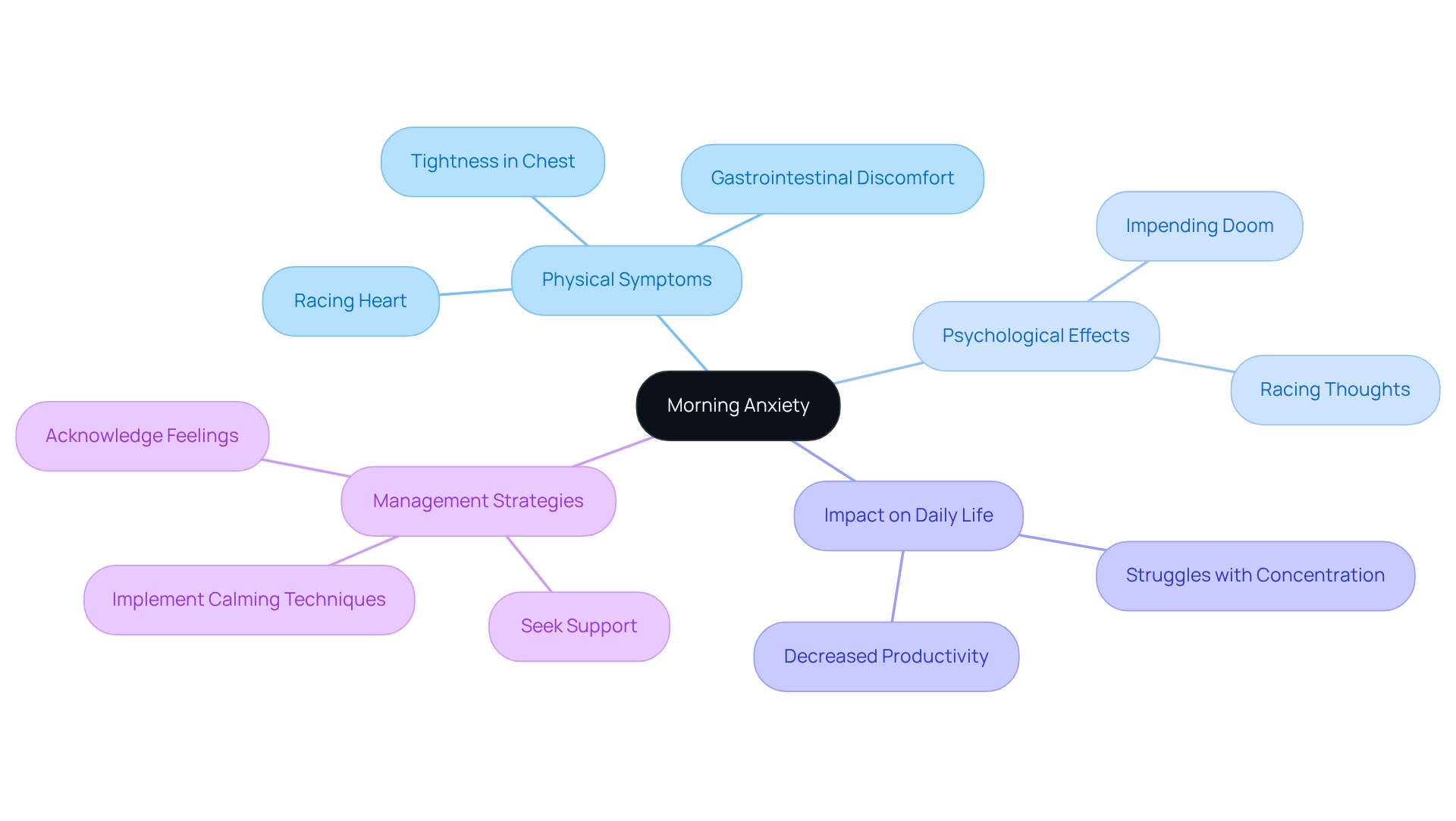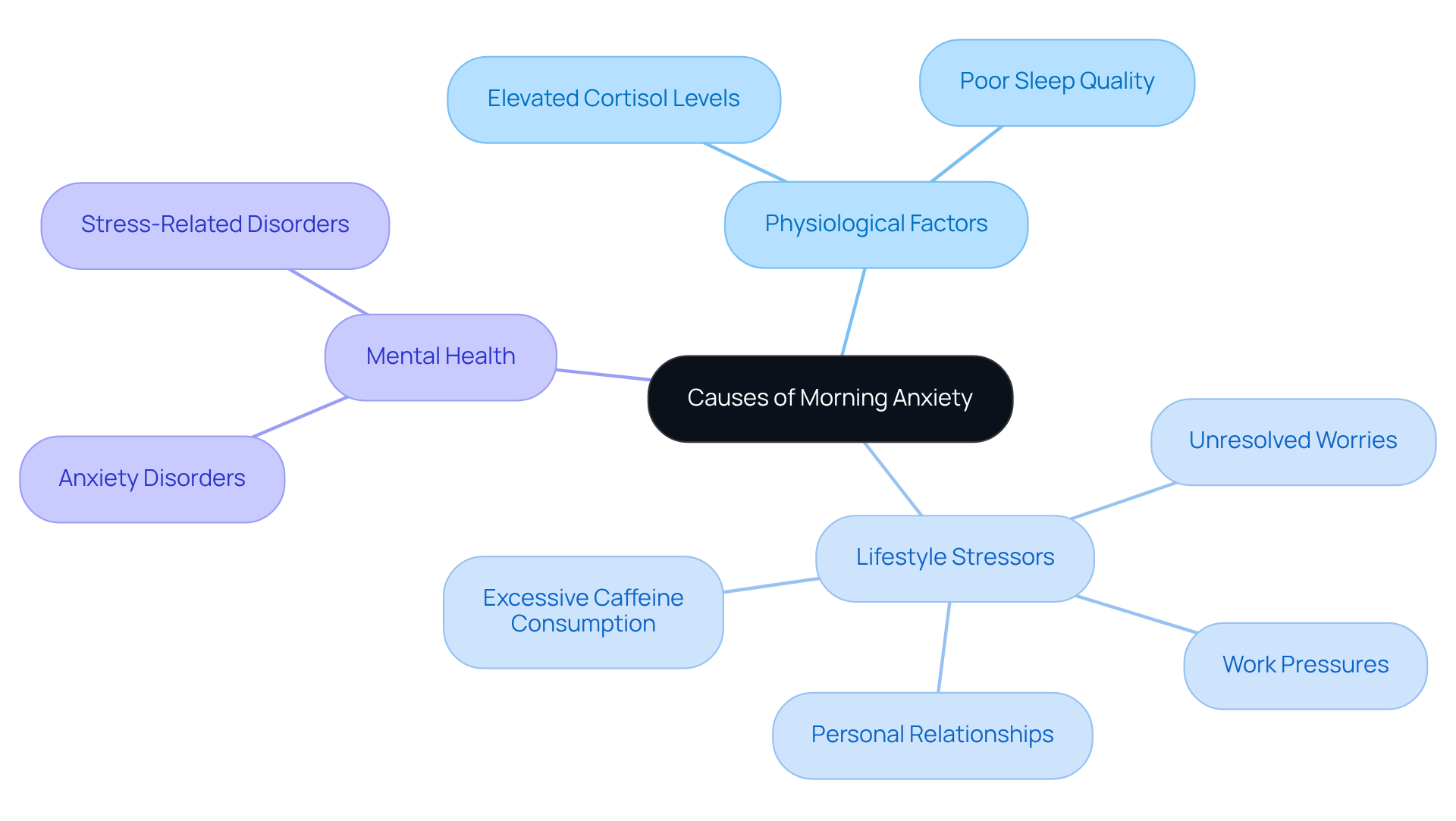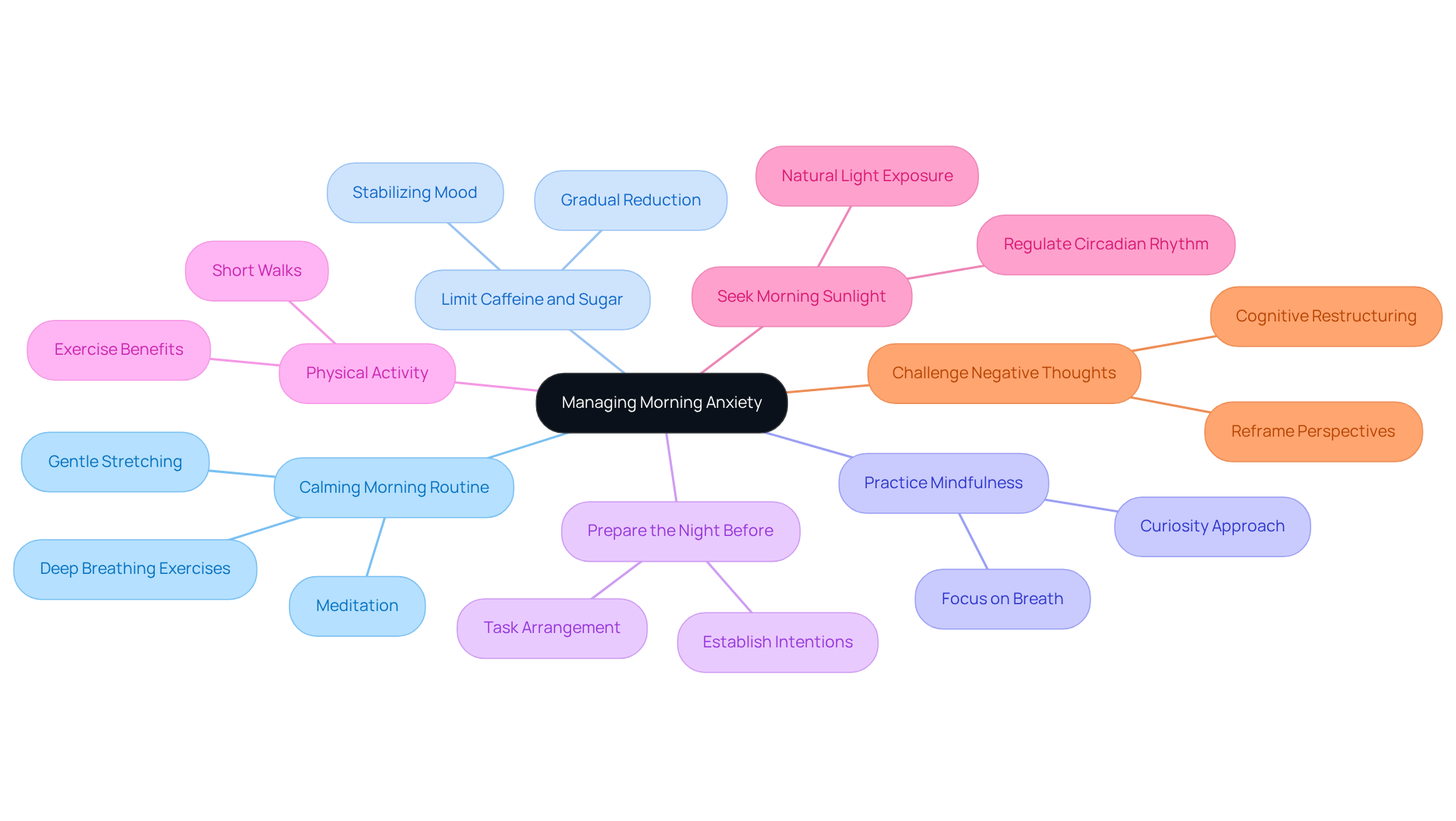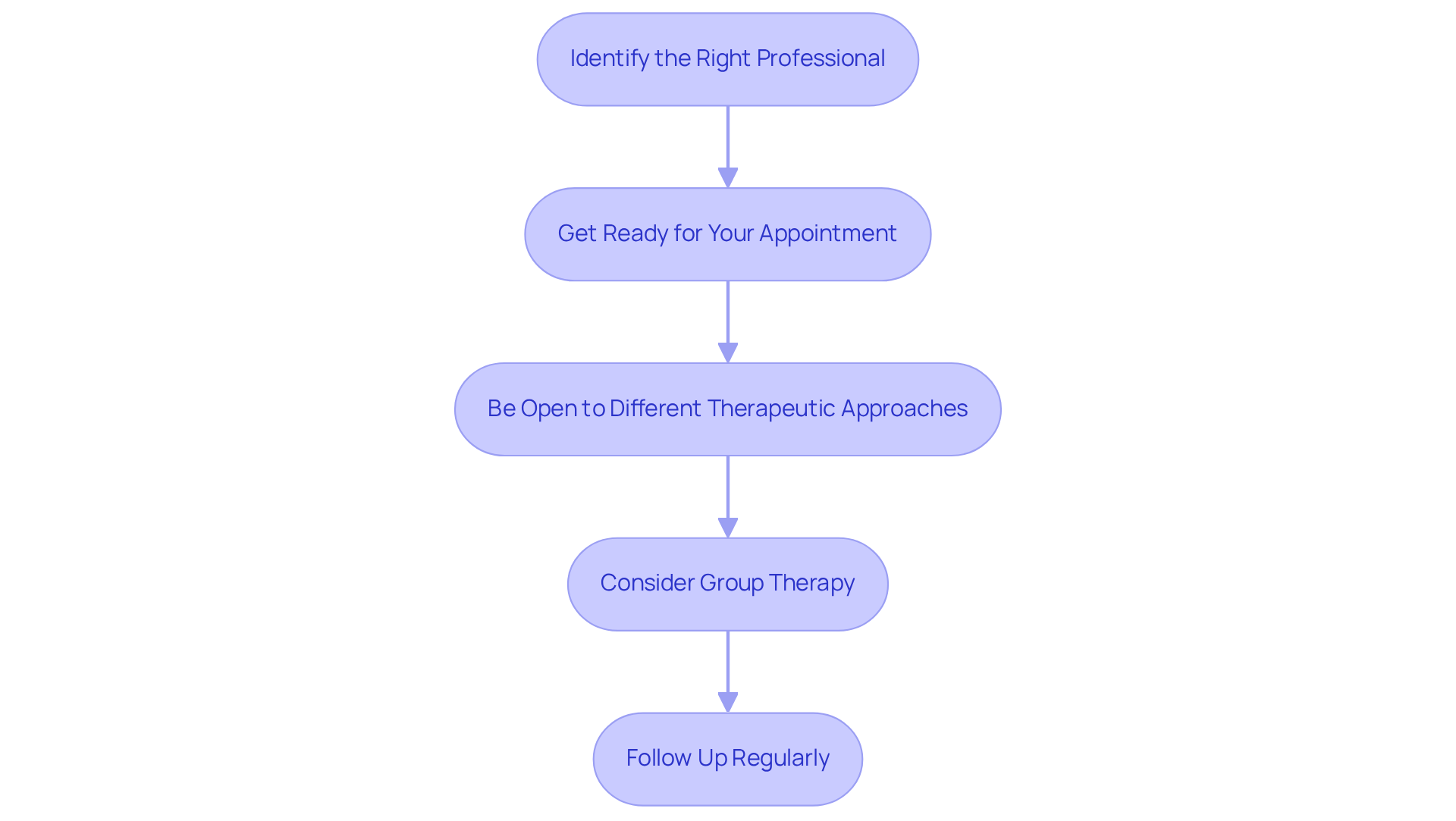Overview
Morning anxiety can feel overwhelming, often stemming from elevated cortisol levels. Have you ever felt a tightness in your chest as you wake, triggered by:
- Unresolved worries
- Poor sleep quality
- Perhaps that extra cup of coffee
It's important to acknowledge these feelings, as they are common and understandable. The article thoughtfully outlines these triggers and offers effective strategies to help you find relief. Establishing a calming morning routine can make a significant difference, allowing you to start your day with a sense of peace. Additionally, seeking professional support can be a vital step towards managing your anxiety and enhancing your overall well-being. Remember, you are not alone in this journey, and there are compassionate resources available to guide you toward healing.
Introduction
Many individuals experience the unsettling feeling of anxiety as the sun rises, a phenomenon that can cast a shadow over the entire day. Morning anxiety, often marked by feelings of dread and racing thoughts, can disrupt productivity and overall well-being. As we explore this further, it’s important to understand the underlying causes of morning anxiety. By recognizing these triggers, we can implement simple yet effective coping techniques that foster a more peaceful start to the day. What if the key to transforming those anxious mornings lies in this understanding? Together, we can navigate these challenges and find a path toward a calmer morning routine.
Define Morning Anxiety: Understanding Its Nature and Impact
Many of us experience anxiety in the morning, which often brings feelings of unease, worry, or dread upon waking. Have you ever experienced anxiety in the morning, feeling your heart racing or a tightness in your chest as the day begins? These physical symptoms can be unsettling and may also include gastrointestinal discomfort. Psychologically, you might experience thoughts racing or a sense of impending doom, which can lead to anxiety in the morning as you consider the day ahead.
Understanding anxiety in the morning is vital, as it can significantly affect how we function throughout the day. It can influence our productivity, mood, and overall mental well-being. For instance, you may struggle to concentrate on tasks, which can lead to decreased performance at work or in your personal responsibilities. Recognizing these symptoms is the first step toward effective management. By acknowledging what you feel, you can begin to implement strategies that promote calm and resilience throughout your day.
As we explore this further, consider the impact of these feelings on your daily life. It’s important to remember that you are not alone in this experience, and seeking support can be a powerful step toward healing. Together, we can find ways to navigate these challenges and foster a sense of peace and well-being.

Identify Causes of Morning Anxiety: Common Triggers and Their Effects
Anxiety in the morning can often stem from elevated cortisol levels, the body's natural stress hormone that typically peaks shortly after waking. This physiological response can lead to heightened feelings of distress, particularly for those already grappling with anxiety in the morning and other anxiety disorders. Overachievers, who often find it challenging to prioritize their own needs over work or family responsibilities, may experience this stress even more intensely. It's important to note that nearly 20% of American adults will encounter some form of mental illness in their lifetime, highlighting the prevalence of stress-related disorders.
Other common triggers for anxiety in the morning include:
- Unresolved worries from the day before
- Poor sleep quality
- Excessive caffeine consumption
- Lifestyle stressors such as work pressures or personal relationships
For instance, as individuals anticipate the challenges of the day ahead, they may experience anxiety in the morning, which compounds their stress. Mental health experts remind us that cortisol can significantly influence our mood and stress levels, especially regarding anxiety in the morning when our bodies are adapting to the day.
Identifying these triggers is crucial for developing effective coping strategies, allowing individuals to manage their stress and improve their overall well-being. Have you ever felt overwhelmed by your past? At The Emerald Couch, we understand the unique challenges faced by overachievers, and we are here to support you in navigating trauma, stress, and burnout. Together, we can work towards healing and a more balanced life.

Implement Strategies to Manage Morning Anxiety: Practical Tips and Techniques
To effectively manage morning anxiety, consider implementing the following nurturing strategies:
-
Establish a Calming Morning Routine: Begin your day with activities that promote relaxation, such as meditation, gentle stretching, or deep breathing exercises. These practices can set a positive tone for the day ahead, inviting peace into your morning.
-
Limit Caffeine and Sugar Intake: Reducing stimulants such as caffeine and sugar can assist in stabilizing your mood and preventing spikes in unease. Gradually decreasing your intake may lead to significant enhancements in your overall stress levels, allowing for a calmer start to your day.
-
Practice Mindfulness: Engaging in mindfulness techniques can ground you in the present moment, helping to reduce feelings of overwhelm and stress. Simple practices like focusing on your breath can be particularly effective. As Judson Brewer points out, "Don’t underestimate the power of curiosity in aiding to break free from that habit of early-day stress."
-
Prepare the Night Before: Arranging your tasks and establishing intentions for the day can reduce the anxiety of unpredictability at the start of the day. This proactive approach can lead to a more peaceful morning. Remember, sleep is medicine; ensuring you get enough rest is essential for lowering morning stress.
-
Participate in Physical Activity: Exercise releases endorphins, uplifting your mood and lowering stress levels. Even a short walk can be beneficial, providing both physical and mental health benefits that nurture your well-being.
-
Seek Morning Sunlight: Exposure to natural light can help regulate your circadian rhythm and improve your mood. Aim to spend some time outside or near a window shortly after waking, allowing the warmth of the sun to embrace you.
-
Challenge Negative Thoughts: Practice cognitive restructuring by identifying and reframing negative thoughts that contribute to stress. This method can enable you to change your perspective and lessen the hold of stress on your early hours. As Mennin emphasizes, "What happens the night before and the day prior does matter."
It's essential to acknowledge that stress levels can rise at various moments for different people. Understanding your unique patterns can assist in customizing these approaches to your needs. Have you ever felt overwhelmed by your past? Embracing these strategies may guide you towards a more serene morning, and if you find it challenging, consider reaching out for support. You're not alone on this journey.

Seek Professional Support: When and How to Get Help for Morning Anxiety
If experiencing anxiety in the morning has become a persistent challenge that disrupts your daily life, seeking professional help is an important step towards healing. Have you ever felt overwhelmed by your past? Here are some effective strategies to guide you on this journey:
- Identify the Right Professional: Focus on therapists who specialize in stress-related disorders or trauma-informed care. Resources such as Psychology Today and the Anxiety and Depression Association of America can assist you in locating qualified professionals who truly understand your needs.
- Get Ready for Your Appointment: Take a moment to record your symptoms, triggers, and any coping methods you've tried. This preparation will provide your therapist with valuable insights into your situation, facilitating a more tailored approach to your treatment.
- Be Open to Different Therapeutic Approaches: Various therapy options, including Cognitive Behavioral Therapy (CBT), mindfulness-based therapy, and EMDR (Eye Movement Desensitization and Reprocessing), have shown effectiveness in addressing anxiety-related issues. Each method offers unique benefits, so being receptive to different approaches can significantly enhance your healing journey.
- Consider Group Therapy: Participating in group therapy can be incredibly beneficial. It allows you to connect with others facing similar challenges, fostering a supportive environment where coping strategies can be exchanged and reinforced.
- Follow Up Regularly: Consistent therapy sessions are essential for tracking your progress and adjusting treatment plans as necessary. Regular follow-ups ensure that your therapeutic journey remains aligned with your evolving needs.
By taking these steps, you empower yourself to manage anxiety in the morning effectively and move towards a healthier, more balanced life.

Conclusion
Experiencing anxiety in the morning can profoundly affect your daily life, influencing productivity, mood, and overall mental well-being. Understanding this experience is essential, as it helps you recognize your feelings and implement effective strategies to manage them. By addressing morning anxiety, you can create a pathway to a more peaceful and productive day ahead.
This article highlights various causes of morning anxiety, such as:
- Elevated cortisol levels
- Unresolved worries
- Poor sleep quality
- Lifestyle stressors
Identifying these triggers is crucial in developing personalized coping strategies. Practical tips, like:
- Establishing a calming morning routine
- Limiting caffeine intake
- Practicing mindfulness
- Seeking professional support
are vital tools in managing anxiety effectively. These strategies not only alleviate symptoms but also foster resilience and a sense of control over your mental health.
Ultimately, addressing morning anxiety is not merely about managing symptoms; it’s about nurturing a healthier lifestyle and enhancing your overall quality of life. Taking proactive steps and seeking support can lead to significant improvements in your mental well-being. By embracing these strategies, you can transform your mornings from a source of dread into an opportunity for calm and clarity, empowering you to take charge of your mental health and pursue the balance you truly deserve.
Frequently Asked Questions
What is morning anxiety?
Morning anxiety refers to feelings of unease, worry, or dread experienced upon waking, often accompanied by physical symptoms such as a racing heart or tightness in the chest.
What are the physical symptoms of morning anxiety?
Physical symptoms can include a racing heart, tightness in the chest, and gastrointestinal discomfort.
What psychological symptoms are associated with morning anxiety?
Psychological symptoms may involve racing thoughts or a sense of impending doom, which can lead to anxiety as individuals contemplate the day ahead.
How does morning anxiety affect daily functioning?
Morning anxiety can significantly impact productivity, mood, and overall mental well-being, making it difficult to concentrate on tasks and potentially leading to decreased performance in work and personal responsibilities.
What is the first step toward managing morning anxiety?
Recognizing and acknowledging the symptoms of morning anxiety is the first step toward effective management and implementing strategies to promote calm and resilience.
Is it common to experience morning anxiety?
Yes, many people experience morning anxiety, and it is important to remember that individuals are not alone in facing these feelings.
How can one seek support for morning anxiety?
Seeking support from others can be a powerful step toward healing, and it's beneficial to explore ways to navigate the challenges of morning anxiety together.




